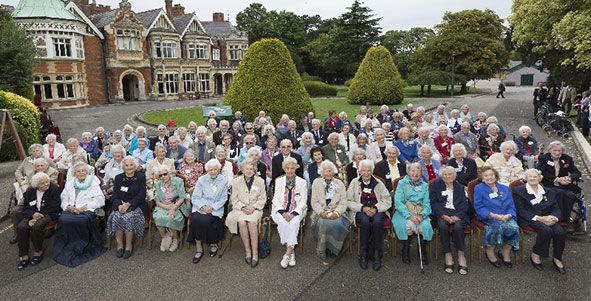OVER 100 VETERANS RETURN TO BLETCHLEY PARK
Posted 7th September 2017
|
Former wartime staff reunited at home of the Codebreakers Seventy eight years to the day since Britain declared it was at war with Germany, a group of over 100 Veterans today returned to Bletchley Park, the scene of their top-secret wartime work. The men and women – all in their 90s or older – came to share stories and show family and friends the place where they made a key contribution to Allied success in World War Two. Of the estimated 9,500 people who worked for Bletchley Park, it is thought that around 300 are still alive, with a third of those gathering at the museum today for the annual celebration of their work. “Today is a very important day in our calendar,” said Iain Standen, CEO of Bletchley Park. “It is our opportunity to host the sadly dwindling number of Veterans and reflect on their service in the Second World War. Today we’ve had a fantastic turnout with well over 100 Veterans who have had a chance to renew old friendships and make new ones, as well as regale our visitors with stories of their wartime service.” One of the Veterans who attended was Mary Watkins, 97 years old, who worked at Bletchley Park during her time in the Intelligence Corps of the ATS. “It was not very pleasant because we had to work in shifts,” she said of her time at Bletchley Park. “The best way I can describe the work to anyone is to say it was like proof reading. We were looking for certain things but we were never told whether it was right or wrong. The work I did was never praised or condemned.” Watkins was also posted to Y Stations in Harpenden and Beaumanor, and during the latter years of the war was working for the Middle East Signals Intelligence Service at Heliopolis in Egypt. “It was so secret and I never told anyone,” she said. “People can say, ‘it’s been out for 30 years’ and it’s foolish of me, but at 97 I’ve kept it for that length of time. It’s lovely to be at this reunion.” Veteran Betty Webb, 94, also worked for the ATS at Bletchley Park and Washington DC, and has been to over 20 reunions for staff, making new friendships over the years. “It doesn’t matter whether you knew each other at the time: you are now brothers and sisters,” she said. Following today’s event, it is likely that more secrets will be revealed as the museum’s Oral History Officer, Jonathan Byrne, said that a further 28 Veterans had agreed to be interviewed for the project. The stories of many Veterans can be found on the Roll of Honour at www.bletchleypark.org.uk/roll-of-honour Dr David Kenyon, Research Historian at Bletchley Park, believes that meeting some of the people who worked here is a valuable resource. “My job is to work with documents, archives and books for five days a week,” he said. “This is my one time in the year when this story really comes to life with individuals talking from their own experience.” |
